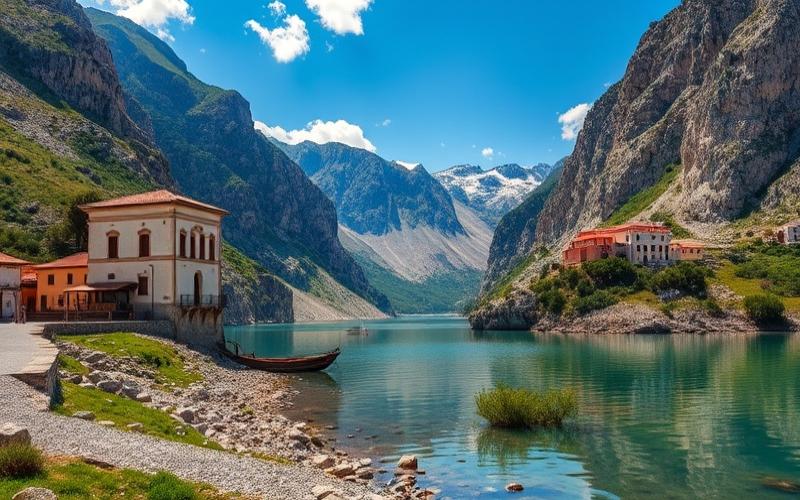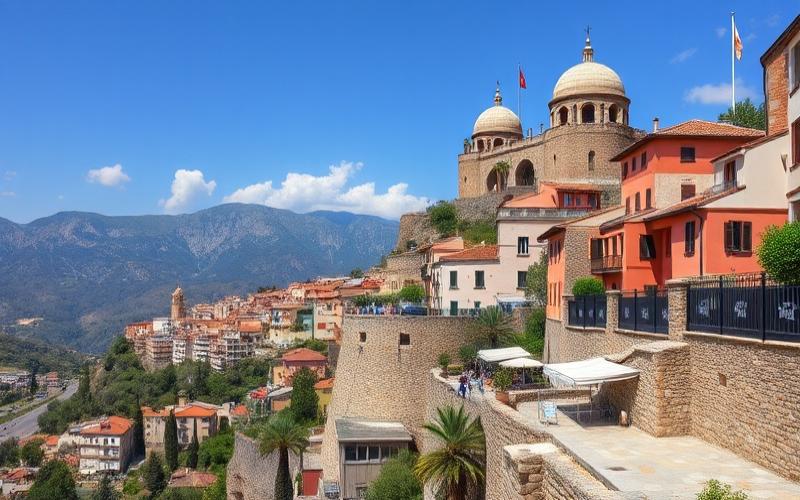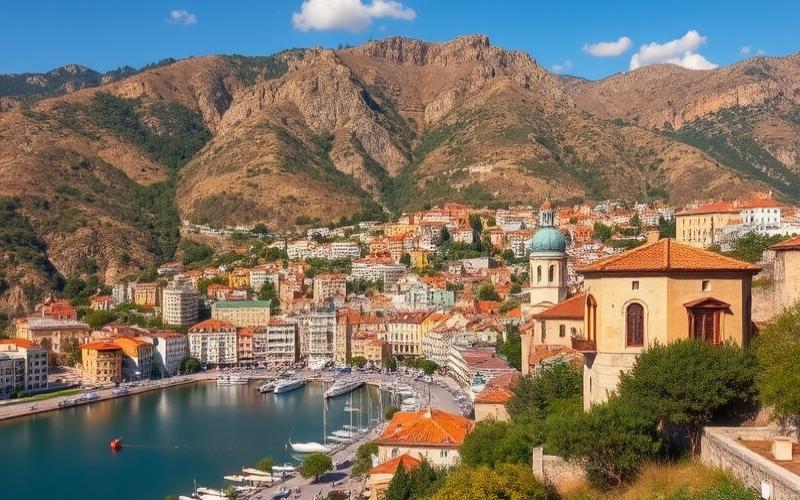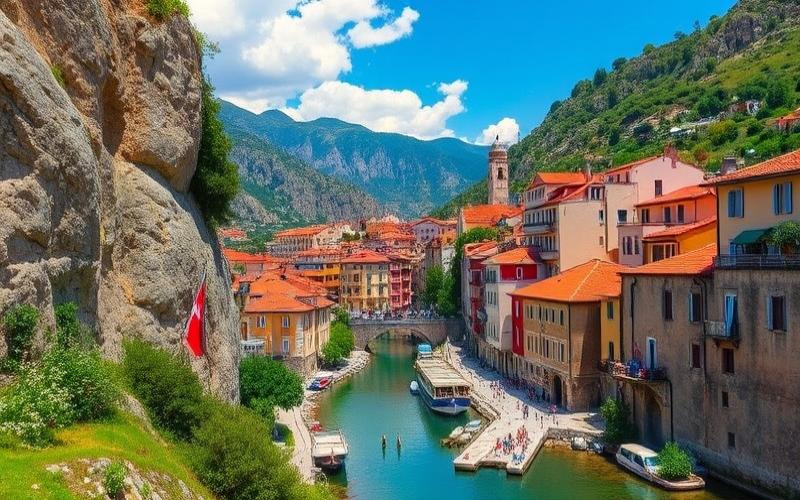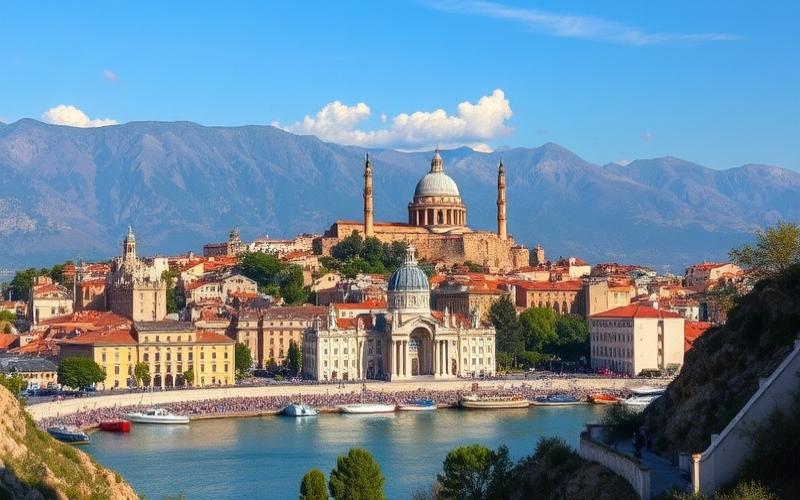
 Published on and written by Cyril Jarnias
Published on and written by Cyril Jarnias
Albania, a Balkan country undergoing rapid transformation, offers compelling opportunities for expatriates seeking to pursue higher education. With an evolving educational system and increasing international openness, Albania presents numerous advantages for international students. In this article, we will explore in detail the higher education options available in Albania for adult expatriates, covering all essential aspects to consider.
The Albanian University System
The Albanian higher education system has undergone significant reforms in recent years, aiming to align it with European standards. Albania joined the Bologna Process in 2003, leading to the adoption of the Bachelor-Master-Doctorate system and harmonization with the European Credit Transfer and Accumulation System (ECTS).
Study Structure
The Albanian university system consists of three cycles:
- Bachelor’s Degree: 3 years (180 ECTS)
- Master’s Degree: 1-2 years (60-120 ECTS)
- Doctorate: 3-5 years
Types of Institutions
There are two main types of higher education institutions in Albania:
- Public universities: State-funded, they typically offer more affordable tuition fees
- Private universities: More recent, they often provide programs in English and international partnerships
Among the most reputable universities in Albania are the University of Tirana, Polytechnic University of Tirana, and Agricultural University of Tirana in the public sector. In the private sector, the European University of Tirana and Epoka University are particularly recognized.
Admission Procedures for International Students
Admission procedures for international students in Albania may vary by institution but generally follow these steps:
1. Eligibility Verification
Ensure your previous degree is recognized in Albania. The Albanian Ministry of Education and Sports is responsible for recognizing foreign degrees.
2. Program and University Selection
Research programs that match your academic and professional goals. Check the language of instruction (Albanian or English) and specific prerequisites.
3. Application Package Preparation
- University application form
- Certified copies of previous degrees and transcripts
- Proof of language proficiency (TOEFL or IELTS for English)
- Motivation letter
- Recommendation letters
- Passport copy
4. Application Submission
Meet application deadlines, which vary by university but are typically between February and July for a September start.
5. Evaluation and Admission Decision
The university will review your application and may schedule an interview (often available remotely for international students).
6. Student Visa Acquisition
Once admitted, you will need to obtain a student visa from the Albanian embassy or consulate in your country of residence.
Good to Know:
Most Albanian universities have an international office to assist foreign students with administrative procedures and integration.
Degree Equivalency and International Recognition
Recognition of foreign degrees in Albania is managed by the National Center for Recognition and Equivalence of Diplomas (QSHA – Qendra Kombëtare e Njohjes dhe Ekuivalentimit të Diplomave). This process is essential for pursuing higher education or working in Albania.
Recognition Procedure:
1. Submit an application to QSHA with required documents (original diploma, transcripts, certified translations). 2. QSHA evaluates your file and determines equivalence with the Albanian system. 3. A decision is made, typically within 45 days.
International Recognition of Albanian Degrees:
As Albania is a signatory to the Lisbon Convention on the Recognition of Qualifications, Albanian degrees are generally recognized in European countries and beyond. However, it is always recommended to verify with the competent authorities of the country where you wish to continue your studies or work.
Funding Studies in Albania
The cost of studying in Albania is relatively affordable compared to other European countries, but it can vary significantly between public and private universities.
- Public universities: between 300 and 1500 euros per year
- Private universities: between 2000 and 5000 euros per year
Funding Options:
1. Albanian government scholarships: The Albanian government offers a limited number of scholarships to international students, particularly for master’s and doctoral programs.
2. Erasmus+ scholarships: Albania participates in the Erasmus+ program, offering mobility and funding opportunities for European students.
3. University scholarships: Some Albanian universities offer excellence scholarships or tuition fee reductions for international students.
4. Home country financial aid: Inquire with organizations in your country about funding possibilities for studying abroad.
5. Student loans: Although less developed than in Western Europe, student loan options are beginning to emerge in Albania.
Cost of Living:
The cost of living in Albania is relatively low. A monthly budget of approximately 400-600 euros should cover housing, food, and daily expenses in major university cities like Tirana.
Good to Know:
Some Albanian universities offer student housing at advantageous rates, which can significantly reduce your monthly expenses.
Continuing Professional Training in Albania
Albania is gradually developing its continuing professional training offerings, responding to the needs of a transitioning economy and growing demand for specialized skills.
Available Training Types:
1. Professional certificates: Offered by specialized institutes and some universities, these short programs aim to develop specific skills in areas such as IT, tourism, or management.
2. University continuing education programs: Some Albanian universities offer continuing education programs, often in partnership with local or international companies.
3. Language training: Given the growing importance of tourism and international relations, many language schools offer intensive courses in Albanian, English, and other European languages.
4. Online training: More Albanian institutions are developing online training offerings, facilitating access to continuing education for working professionals.
Training Recognition:
The Albanian Qualifications Framework (AQF) aims to harmonize and recognize professional qualifications. It is aligned with the European Qualifications Framework, facilitating international recognition of training completed in Albania.
Online Programs Suitable for Expatriates
In response to growing demand for flexibility, particularly from expatriates, Albanian universities and international educational platforms are increasingly developing online study options.
Albanian Universities Offering Online Programs:
1. University of Tirana: Offers some online courses, particularly at the master’s level. 2. European University of Tirana: Provides hybrid programs combining in-person and distance learning.
International Platforms:
Expatriates in Albania can also access a wide range of online courses through international platforms such as Coursera, edX, or FutureLearn. These platforms offer courses from many renowned universities worldwide, often with the possibility of obtaining recognized certificates.
- Flexible scheduling
- Ability to take courses from international universities while residing in Albania
- Access to a wide range of subjects and specializations
- Opportunity to develop an international network
Good to Know:
Some online programs offer options for in-person meetings or internships, allowing for a combination of distance learning with local practical experience.
Impact of International Education on Career
Pursuing higher education in Albania can have a significant impact on your career, both locally and internationally.
Advantages in the Albanian Job Market:
1. Understanding of local context: Education in Albania allows you to develop a deep understanding of the local market, business practices, and Albanian professional culture.
2. Professional network: Studying in Albania offers the opportunity to build a valuable local network, essential for your future career in the country.
3. Language proficiency: Language immersion during your studies will enable you to acquire proficiency in Albanian, a major asset in the local job market.
International Perspectives:
1. Intercultural experience: Studying in Albania demonstrates your ability to adapt to different cultural environments, a skill highly sought after by international employers.
2. Language skills: Proficiency in Albanian, in addition to English and potentially other languages, can open opportunities in companies operating in the Balkans or having business relations with Albania.
3. Regional expertise: Education in Albania can position you as an expert in the Balkan region, an asset for companies seeking to establish or expand in this part of Europe.
Degree Recognition:
Thanks to the progressive alignment of the Albanian educational system with European standards, degrees obtained in Albania are gaining international recognition. However, it is always recommended to verify the specific recognition of your degree in the country where you wish to work.
Personal Development:
- Autonomy and adaptability
- Open-mindedness and tolerance
- Ability to face challenges in a new environment
Good to Know:
Many international companies are establishing themselves in Albania, creating opportunities for graduates with dual local and international competencies.
Conclusion
Pursuing higher education in Albania as an expatriate offers a unique and enriching experience. The country, undergoing rapid transformation, presents an educational system in constant improvement and growing international openness. Opportunities are varied, whether in traditional universities, continuing education programs, or online learning options.
Albania offers an interesting balance between relatively affordable study costs and improving educational quality. Moreover, the experience gained in this rapidly developing country can prove to be a valuable asset for your future career, both locally and internationally.
However, it is crucial to thoroughly research the specifics of the Albanian educational system, admission and degree recognition procedures, as well as available funding options. Careful preparation will allow you to make the most of this international educational experience.
Ultimately, studying in Albania is not just about obtaining a degree. It is an opportunity to immerse yourself in a fascinating culture, develop valuable intercultural skills, and build a unique professional network at the crossroads of Eastern and Western Europe.
Disclaimer: The information provided on this website is for informational purposes only and does not constitute financial, legal, or professional advice. We encourage you to consult qualified experts before making any investment, real estate, or expatriation decisions. Although we strive to maintain up-to-date and accurate information, we do not guarantee the completeness, accuracy, or timeliness of the proposed content. As investment and expatriation involve risks, we disclaim any liability for potential losses or damages arising from the use of this site. Your use of this site confirms your acceptance of these terms and your understanding of the associated risks.



